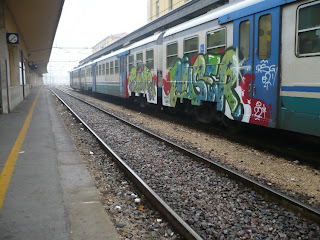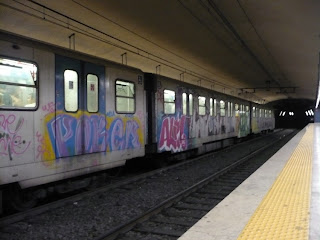Bella Roma. Mark and I went down to Rome late Friday to meet his parents and his family friends
Jane and Terry before they all headed back to the States. After a long and convoluted trip, we arrived at the plush hotel [note to self: be sure to travel when possible with people who like to stay in fancy places] in time to go to bed.
In the morning, Mark and I set out on what will easily be one of the most memorable and certainly most historic runs I will have the pleasure of running in in my life. As an introduction to
Rome, it sure beats the sardine-can red tourist buses with the open tops. The city speaks for itself, but it also helped that Mark lived in Rome for a few months back in 2005. In addition to the echoes of Caesars, Michelangelo,
fratricide, and
il Duce (no, New Yorkers and Chicagoans, I’m not talking about a 53-year old Cuban pitcher with a high leg kick), Rome holds memories ‘round most corners for Mark. Running tour guide anyone? Mark almost worked as exactly
that when living in Rome; luckily he ran with me for free.

Approaching from the west, Mark and I ran towards the newly risen sun; stopping in front of the Acqua Paola fountain, we tried to catch our breath only to have it whisked away by the view of the city stretched out before us, throwing off its nighttime blanket of mist and haze. Dropping down the hill into the city, Mark and I ran past many of the nearly infinite famous sights of Rome: the Coliseum, the forerunner of nearly all modern sports’ stadiums, looking like she could still host some games; the Forum, the Circus Maximus and the Palantine Hill; along the Tiber River; countless piazzas, including the Piazza del Campidoglio with its geometric paving, surrounded by the Capitoline Museums, which opened to the public in 1734. Last time I checked, we in the colonies were still operating under a pre
-mercantilist economy at that point, 40 years off from our own first museum – though work may have begun on the
Giles Corey mannequin in Salem, MA.

The home stretch of our run led us through Rome’s largest landscaped park, Villa Doria Pamphili. After the enrapturing maze of alleys and monumented thoroughfares, Mark and I were thrilled to run free like gazelles (or water buffalo, depending whose stopwatch you trust). It is a gorgeous park that curves along the crests of hills south of Vatican City, full of historic villas, African savanna trees and grasses, Romans exercising, a hedge maze, space.
After a stout breakfast at the hotel, we merry band of six set out to conquer Rome. We walked approximately 72 kilometers, each of us wearing through at minimum two pairs of shoes. We revisited many of the sights on the morning run itinerary, this time at walking pace and with the requisite POSes (photo opportunity stop) every 7 feet. Other highlights included the requisite Trevi Fountain and Spanish Steps; tap-dancing buskers in Piazza Navona, which may house the first instance of
sculpture as a medium for trash talking; the Pantheon, which is the most pagan-temple-feeling church I’ve ever been in; peeking through the window at World Cup rugby outside the Abbey Theatre Pub; the sun setting behind the Coliseum; the church of Santa Maria in Aracoeli and her long staircase, built at the end of the bubonic plague. An unusual way to celebrate maybe, but a beautiful setting.
In full disclosure, I was in Rome for all of 36 hours and found nearly everything beautiful. During the weekend, Ray Allen, a new addition to the Boston sports pantheon (more on that in a moment), was stopped by a Roman policeman for riding his scooter into a no-drive zone. In the related
article, Ray is quoted as saying, "Wow! What a city! They keep their ruins!" Yes, there is a lot to see and I clearly need to return.
The question of the hour is: Will I ever again have the opportunity that occasioned our visit in the first place? Boston Celtics. Playing the Toronto Raptors. In Rome. Yes, it was a pre-season
exhibition game, and yes, the starters didn’t play the entire fourth quarter, and yes, there was no
organ player pumping up the crowd but... a) the cheerleaders are already in great form; b) team mascots dunking a basketball by launching themselves improbably through the air off of trampolines looks cool in any language; c) Paul Pierce is a beast; and, most significantly, d) Kevin Garnett is an even bigger beast and has single-handedly upped my caring factor for the NBA to Code Orange. Or something higher than it was before.

In addition to living
la bella vita en
bel paese with a lifelong friend who triples as jogging tour guide, link to fun-loving, bank-rolling parents, and Italian slang translator, I get to be a Boston sports fan during an unusually
giddy period. If I pinch myself anymore, I won’t have any pinches left for the babies when I throw my hat in the ring for the 2016 Presidential election. Go Sox, Pats, BC Eagles, et al.
Mille mille grazie to the Langones for including me in their vacation.
Here are some photos from the whirlwind day.

















